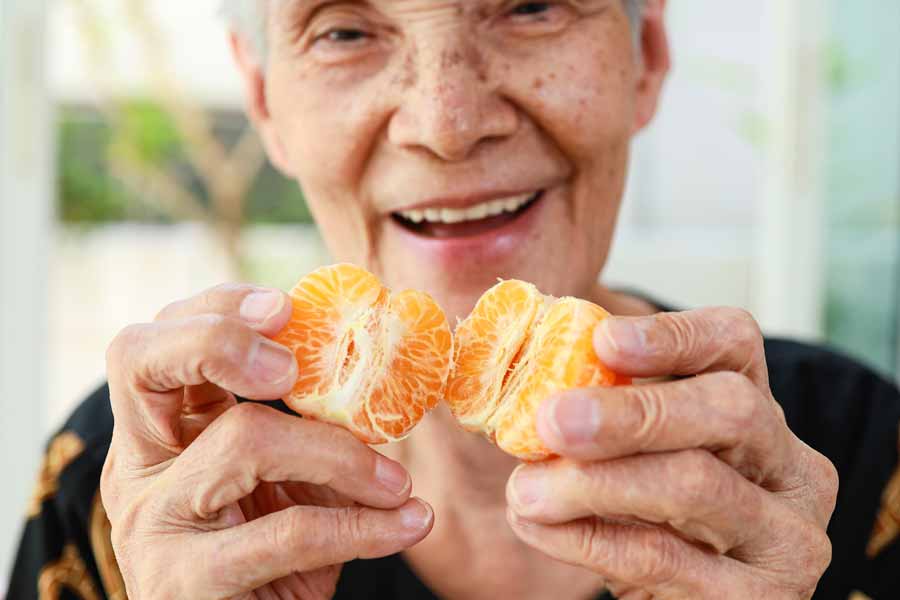5 Tips to Improve Nutrition for Seniors with Dementia

5 Tips to Improve Nutrition for Seniors with Dementia
Getting adequate nutrition is instrumental in maintaining quality of life as an older adult. Poor nutrition for seniors can impact every facet of mental and physical health, leading to issues ranging from lethargy, falls and a weakened immune system to anxiety, depression or even heart failure. Luckily, by paying greater attention to nutrition and serving up the right food for seniors, many of these health complications may be avoided.
How can Dementia Affect Nutrition for Seniors?
A whole host of social, environmental and physical factors may contribute to a decline in nutrition for seniors. Seniors who live alone, for example, might find themselves opting for convenience foods over more nutritious choices. Alternatively, a senior with significant mobility issues might struggle to get to the grocery store to buy fresh food.
For seniors with dementia, preparing meals and eating can become even more of a challenge. With increasing memory loss, they may start to forget which ingredients they need to buy, or even how to prepare their favorite meals. In the later stages of Alzheimer’s disease or dementia, the act of eating can become a challenge in itself, with chewing and swallowing often becoming difficult to navigate.
Practical tips to Improve Senior Diets
- Introduce more variety to their diet. Including a range of grains, dairy products, protein, oils, fruits and vegetables is a great place to start in improving nutrition for seniors. For older individuals, protein is of particular importance, as this macronutrient helps prevent loss of muscle and unintended weight loss. Some great sources of protein include meat and poultry, eggs, beans, Greek yogurt, and lentils.
- Choose foods rich in micronutrients. Micronutrients are just as valuable in food for seniors. For example, vitamin B-12 may prevent anemia, neurological changes, tiredness and weakness, and can be found in foods like salmon, tuna, beef and eggs. Many seniors are unable to absorb vitamin B-12 from food sources, though, therefore fortified foods and supplements are often recommended. Calcium is also of great importance for aging adults thanks to its role in maintaining bone health alongside vitamin D. Dairy products like yogurt, cheese and milk, and some vegetables like edamame, kale and broccoli are all excellent sources of calcium.
- Adapt their favorite meals. Improving nutrition for seniors doesn’t have to mean a complete dietary overhaul, and striving to be more healthful should never compromise enjoyment of food. And with many seniors experiencing reduced appetite, serving foods they know and love may be a valuable way to encourage eating. Something as simple as adding some fresh, vitamin-rich vegetables to their favorite dinner can be a great step in improving nutrition for seniors. For seniors with dementia, offering them the foods they know and love and in the routine they prefer may be particularly useful to encourage optimal eating habits.
- Identify any practical difficulties with eating. Many seniors struggle with reduced appetite or ability to prepare and cook food independently. In some cases, though, the actual process of eating food may also become difficult. For example, seniors may struggle with dental issues, and Alzheimer’s disease or dementia can lead to a reduced ability to chew or swallow. If you have noticed signs of difficulties with eating in your loved one, consult their doctor for advice as soon as possible. Early intervention can help you find an effective solution that will allow them to continue accessing the vital nutrition they need.
- Don’t forget about hydration. Nutrition for seniors should always be supported by adequate hydration. With issues like reduced sensitivity to thirst cues alongside medication side-effects, health conditions or decreased kidney function, it’s not uncommon for seniors to suffer from dehydration. Seniors can stay well-hydrated by drinking water, milk or fruit juices (be mindful of the added sugar which may be present in juice, though). Incorporating foods rich in water like fruit, vegetables and soups into senior diets can also support good hydration.
How can Memory Care Improve Nutrition for Seniors?
Nutrition for seniors is always a priority in any senior living facility. With delicious meals designed to meet the nutritional needs of seniors prepared daily by expert chefs or cooks, residents are able to sit back and enjoy each meal as the hassle-free, social experience it should be. Senior diets and hydration are monitored carefully, allowing any difficulties to be highlighted and addressed as quickly as possible.
In memory care facilities in San Antonio like Pipestone Place, professional caregivers are on hand to assist seniors with the physical aspects of eating that may become difficult with the progression of dementia. In memory care, special considerations can also be taken into account to make mealtimes easier for seniors with dementia. For example, food for seniors may be presented in a way that helps a resident recognize their food, or they may be served softer foods as advised by a doctor or speech therapist if they have difficulties with chewing or swallowing.
Why Memory Care is a Great Choice
Moving your loved one to memory care in San Antonio can be a tough decision, but seeking professional support is often an incredibly positive step for both seniors and their family caregivers. While your loved one is supported by expert dementia caregivers, you will be able to enjoy quality time together, free from the pressure of being their primary caregiver. If your loved one with Alzheimer’s disease or dementia is struggling to get the right nutrition they need, get in touch today to find out how we can help.
Note: Before altering a senior’s diet, please consult their doctor or specialist dietician for tailored guidance, as nutritional requirements and dietary needs may vary.
- Thank You, Family Caregivers - November 22, 2022
- Fall Activities for Seniors with Dementia - October 28, 2022
- 7 Benefits of Memory Care for Seniors and Their Loved ones - September 26, 2022
